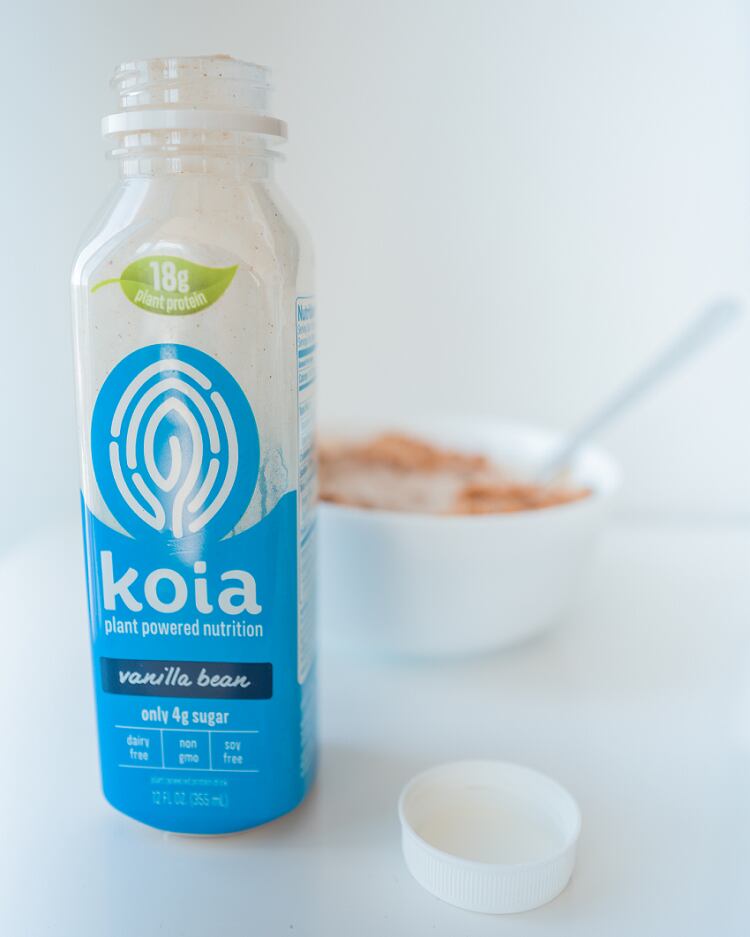Koia launched 18 months ago with national distribution through Whole Foods of its core range: Vanilla bean, cacao bean, and coconut refrigerated almond milk beverages fortified with a plant protein blend.
The company debuted two new SKUs – cold brew coffee and cinnamon horchata – in August 2017 with an expanded distribution footprint of Earth Origins Market, Natural Grocers, Erewhon Natural Foods, Fresh Thyme, Giant, Stop & Shop, Wegmans, and others.
“We have aggressive growth and you're only able to accomplish that if the market likes the product and so we're clearly resonating with consumers,” co-founder and CEO, Chris Hunter, told FoodNavigator-USA.
In an era where consumers are inundated with a slew of plant protein product options, what makes Koia products so likable? According to the company, the brand’s 5:1 protein to sugar ratio for its five almond milk SKUs is what sets it apart from competitors, as well as its proprietary blend of three plant proteins: brown rice, hemp, and pea protein.

Hunter said one of the most important aspects of building the Koia brand has been the development of a "world class" team. "It often gets overlooked," he said. In the last 12 months, co-founders Baker and Hunter (pictured above) have expanded from three to eleven employees in charge of heading up each of the major divisions of the company.
Taste just as important as nutritional profile
“It was really important for us that our customers did not have to compromise,” Hunter said. “For a long time, a natural consumer who's probably a label reader would look at a nutritional panel and ingredient deck and would make their decision based on that. And they were probably used to compromising on flavor.”
According to the company, the trio of plant proteins gives Koia beverages a more complete amino acid profile and higher quality protein content as well as a better-tasting flavor and texture profile.
“With Koia, we choose to make our own almond milk to ensure an excellent flavor profile,” co-founder and VP of product development Dustin Baker said.
“We also use whole food ingredients such as cocoa powder and vanilla beans, resulting in a simple, smooth, and creamy protein beverage with flavor profiles that are described as being very decadent."
With growth comes standardization
Koia recently introduced its standardized labels such that all SKUs now contain 190 calories, 18 grams of plant protein, and 4 grams of sugar. The company also brought down its price point to $4.99 per 12-ounce bottle.
According to Hunter, it can be a frustrating to pick up a beverage with the assumption it matches the calorie and nutrition profile of other products in the range, only to find out there are major variations in calories, protein, or sugar content.
“The standardizing was just a function of us growing and wanting to deliver on a promise to the consumer,” he said.
“We were really focused on accomplishing this 5:1 protein to sugar ratio and consistent calories, consistent sodium and fiber delivery that people could rely on.”

Could beverages migrate into snack territory?
According to SPINS data, more than 66% of consumers claim to be actively trying to increase the amount of protein in their diets, and liquid protein/meal replacements are the fastest growing format within the protein category, up 6.1% between 2015 and 2016.
Unlike other plant protein beverage brands such as Soylent and Ample that position themselves as meal replacements for an increasingly time-crunched generation, Koia is targeting the in-between meals hours and says its flavor profile also makes it a fit for indulgent eating occasions.
“People are looking more and more to beverages as snacks as opposed to the traditional bar or bag of something... drinks are now included in that kind of option,” Hunter said.
Its newer flavors of cold brew coffee and cinnamon horchata have set up the brand to take advantage of an on-the-go breakfast crowd as well, according to Hunter.
Conquering the ‘highly-competitive’ chilled beverage section
Boomers and millennials alike are gravitating towards the grocery store perimeter – an area that is growing 2.7 times the rate of whole store layout – seeking healthy, grab-and-go chilled options including beverages and products with added protein, according to IRI.
Rolling out nationwide with Whole Foods has helped Koia gain some brand credibility among health-focused consumers especially in the highly competitive chilled beverage section, Hunter said.
“Retailers are inundated with options and there's only so much shelf space and they have a job to do, which is to optimize that shelf space to maximize revenue.
“These [Koia] SKUs will generate more revenue than probably 80% of what's in the cooler right now."
